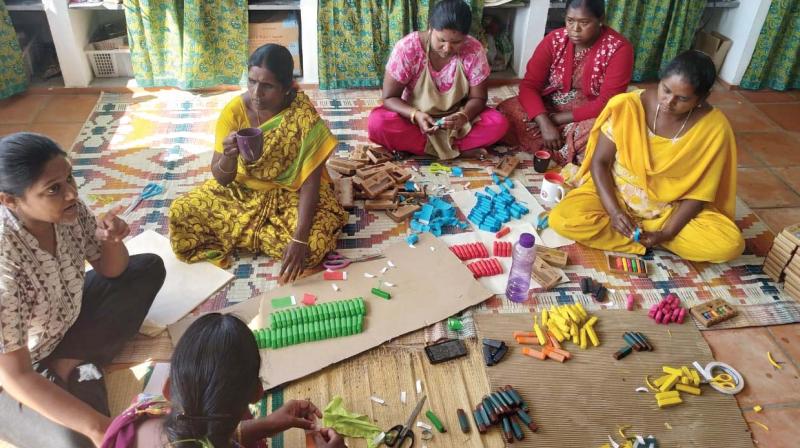Hoopoe on a Hill: A honey-filled story of tribal welfare
The NGO, Hoopoe on a Hill – founded by two youngsters Nishita Vasanth and Priyashri Mani, works with the Adivasis.

BENGALURU: The world celebrated the International Day of Indigenous Peoples on August 9, but have things really changed for the Adivasis in our country? Have they been given equal opportunities or does the stigma of untouchability still singe them? Perhaps the answer lies in Palani Hills in Kodaikanal region.
The NGO, Hoopoe on a Hill – founded by two youngsters Nishita Vasanth and Priyashri Mani, works with the Adivasis. It has been empowering the marginalised tribals and is creating products that are organic and sustainable.
Nishita and Priyashri struck upon the idea of starting the NGO when they visited villages in Palani Hills to understand of the life of Adivasis, who stay in forests and also take care of them. They chanced upon the insightful and traditional hunter-gatherer life and had the opportunity to understand the practice of collecting honey by Paliyan and other tribes.
Nishita told Deccan Chronicle, “As we worked on documenting the histories of tribals for a project funded by INTACH Delhi, we discovered a rich and wonderful aspect of traditional hunter-gatherer life in this region. The Paliyans, an indigenous tribe in the Palani Hills, foray into the Shola forests in groups for days on end to gather honey. They camp deep inside the forests and build their tools on the spot with vines and dried twigs. They smoke out the bees, deftly collecting only the honey chamber of the hive. The honeycombs are brought down and the honey is extracted, leaving behind hives for the bees to build honeycombs for the next season. The Adivasis return with cans of honey on their long journey home. They have a long tradition of trading honey, earlier in exchange for cloth, salt or whatever they needed, and now, for money. "
The exchange of ideas between Nishita and Priyashri eventually culminated launching the organisation that works with Adivasi communities in Palani Hills. The two founders moved to Kodaikanal from Bengaluru to work with these communities. They have also built a low-cost, sustainable mud house from the scratch in Kodaikanal and are living in it. They follow and advocate sustainability. They are the customers of wild honey sold by members of the Paliyan tribe.
‘Hoopoe on a Hill’ works with ethically-sourced, non-exploitative beeswax and sells organic honey, organic avocados, passion fruits, beeswax and organic beeswax wraps and is coming up with natural and organic beeswax crayons. The NGO, an all-woman enterprise, has employed local women and the number is growing every year.
"One Adivasi in the village asked us if we would be interested in buying some honey. Initially, we bought small quantities for our homes, family and friends. But we kept getting calls asking for more honey. That was when we decided that we needed to sell the honey to make this viable. So the company grew organically. The following year, along with honey, we were asked if we wanted beeswax too. That’s when we started experimenting with beeswax. Several rounds of testing and experimentation have led to beeswax wraps and crayons. We are proud of these products because they are unique. We were among the first to make beeswax wraps in the country. So we provide a constant market for their honey that is fair and non-exploitative,” explains Priyashri.
The NGO claims that they have many success stories of tribal people benefitting financially from their work. In 2015, when ‘Hoopoe on a Hill’ began formally collecting honey from the Paliyans, the organisation worked with two families in one village. Over the last four years, their relationship with the Adivasis has grown. “It is a source of great pride that more and more Adivasis have chosen to trust and work with us. Today, ‘Hoopoe on a Hill’ works with over 100 families across 12 villages,” the two founders said.
‘Hoopoe on a Hill’ now works out of a remote location, 9 km from Kodaikanal town where employment opportunities are scarce. They provide a non-exploitative and safe work environment for the women who work with them.

